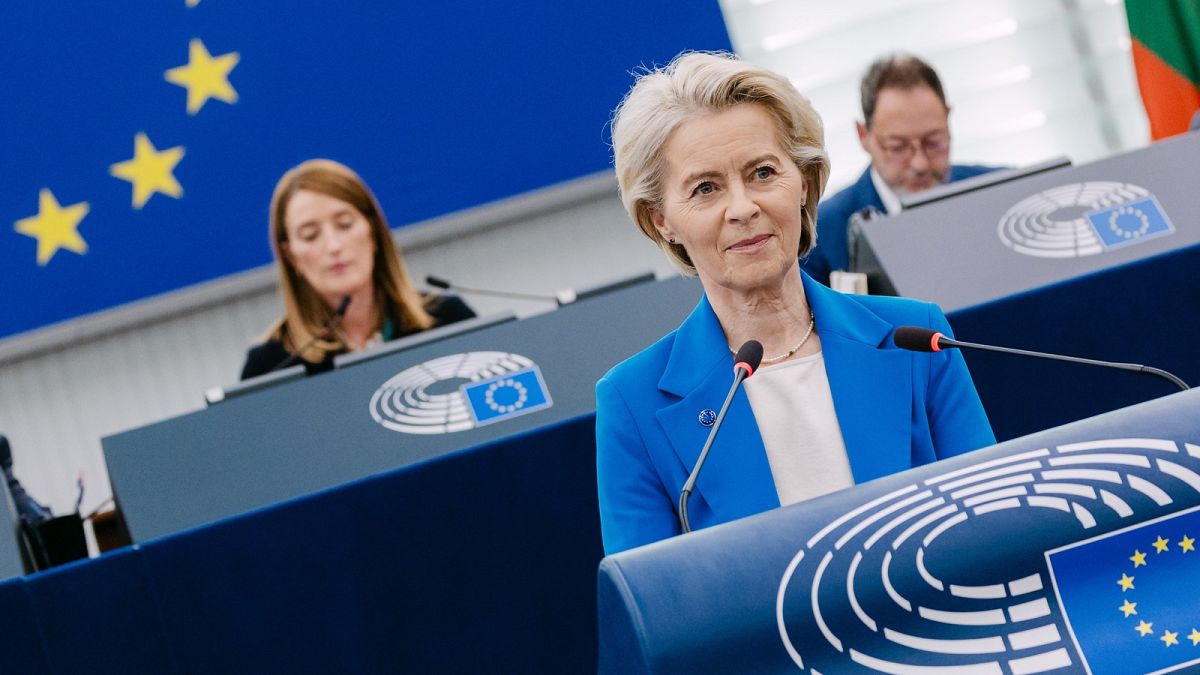
ADVERTISEMENT
Ursula von der Leyen has survived two back-to-back motions of censure against her European Commission as centrist parties moved in sync to back her presidency.
The motions, filed by the far-right and the far-left groups in the European Parliament, were debated on Monday evening and voted on Thursday at noon.
The simultaneous bids lacked a realistic chance to succeed and failed, by a considerable margin, to reach the necessary double majority to pass.
The text filed by the Patriots for Europe (PfE) received 378 votes against, 179 votes in favour and 37 abstentions, while the corresponding move by The Left received 383 votes against, 133 in favour and 78 abstentions.
The number of lawmakers supporting von der Leyen was slightly larger than in July, when the Commission chief faced her first vote of no confidence. Back then, the tally had shown 360 votes against her dismissal, 175 in favour, and 18 abstentions.
The fact that von der Leyen, who was not present in Strasbourg on Thursday, made it through so comfortably reflects a growing fatigue among pro-European forces, who have complained about the trivialisation of the prerogative to file motions of censure.
Her speech on Monday was remarkably less fiery and more succinct than in July.
“The point of this unity is not necessarily for us to agree on every detail,” she told lawmakers in a renewed appeal to close ranks against adversity.
“In fact, tension and debate are an inherent and important part of policy making. But, perhaps more than ever before, it is about the bigger picture.”
Still, battling three motions of censure in such a condensed period of time casts an ominous shadow over von der Leyen’s second mandate, whose ambitious agenda risks being hamstrung by increasing polarisation.
Rival motions from opposite ends
The motions were formally submitted last month by the Patriots and The Left, representing opposite sides of the political spectrum.
One common thread bound the two bids: the backlash against the EU-US trade deal and the highly disfavourable terms it has imposed on European exporters.
The agreement, which also includes non-binding pledges to invest €750 billion in US-made energy and spend €600 billion in the American market, remains under intense criticism from all sections of the political spectrum.
In a recent poll, 52% of respondents qualified the deal as a “humiliation” for Europe.
Von der Leyen has admitted the agreement is “imperfect”, but insists it is “solid” enough to navigate the commercial turmoil unleashed by US President Donald Trump.
The Patriots and The Left shared another grievance: the EU-Mercosur free trade deal that von der Leyen concluded in December last year and whose legal texts are now up for adoption.
Both political groups raise concerns about the potentially damaging impact on European farmers, a prominent theme in French politics.
They also equally lambast von der Leyen’s lack of transparency.
On the rest, they differed. The Patriots complained about the Commission’s handling of irregular migration and “misguided” green policies, whereas The Left assailed its “failure” to address the climate and social crisis, and Israel’s offensive in Gaza.
